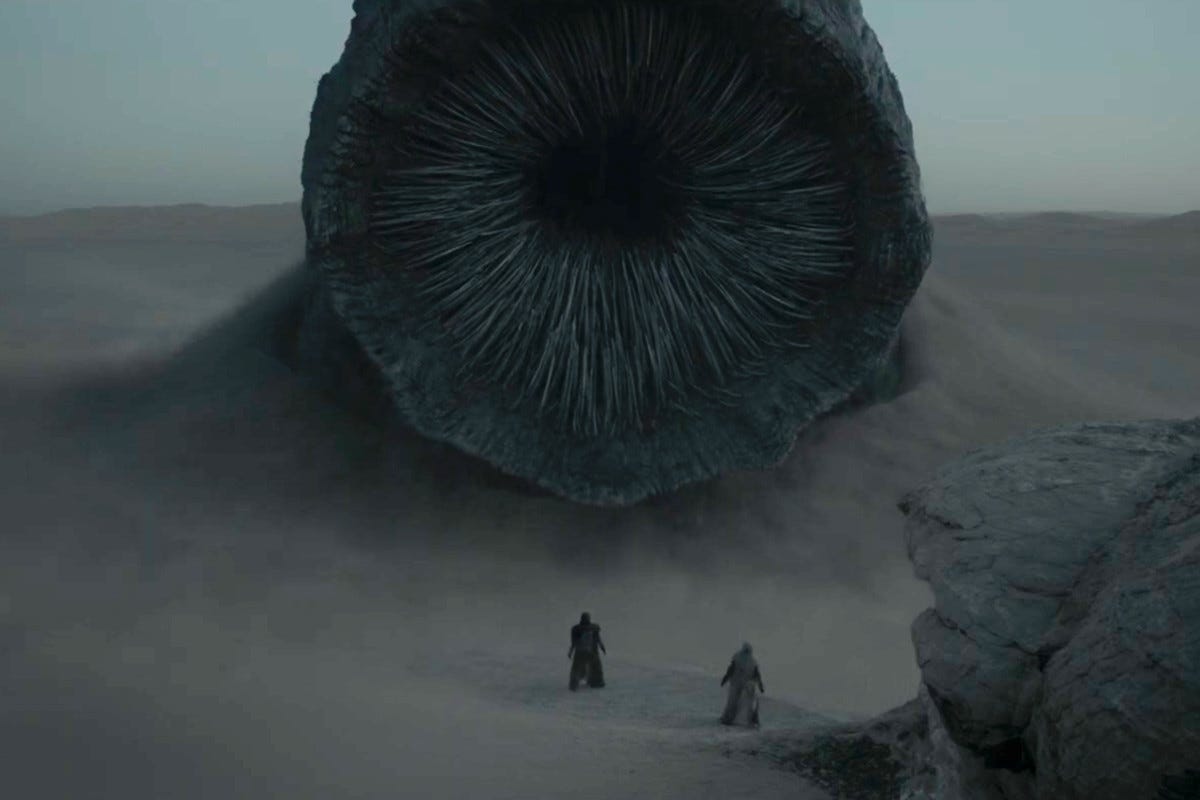There’s something about Dune director Denis Villeneuve’s style of filmmaking that leaves me cold. His movies – from Sicario in 2015 through Arrival and Blade Runner 2049 to the just-released Dune – are technically proficient and visually exquisite. They also conjure up feelings of alienation and detachment in viewers, core themes Villeneuve clearly wishes to pursue with relentless determination in his films.
It’s an aesthetic approach that, oddly enough, works best for me in Sicario, his first and most grounded major film. Where his subsequent movies dwell on first contact with alien lifeforms, artificial intelligence (and artificial humanity), and now a complex story involving interstellar feudalism and messianism, Sicario focuses on the brutality of America’s war against Mexican drug cartels as seen through the eyes of a young FBI agent played by Emily Blunt. Villeneuve’s dissociated directorial approach mirrors the growing alienation felt by Blunt’s character as she’s drawn deeper and deeper into the shadows and faces moral compromises with increasing frequency.
If this detached style works on an aesthetic level, however, it often falls short on visceral and emotional ones. In many ways, that’s the point: Villeneuve aims to cultivate in the viewer the same alienation felt by his protagonists. But it also makes it hard for audiences to connect with these characters in real or meaningful ways; Villeneuve makes impressive films about abstract ideas and high concepts, not individual people with their own hopes, fears, and aspirations. It’s certainly a valid and often laudable artistic objective, but one that always carries with it the risk that a film’s aesthetic and conceptual ambitions overwhelm its human elements.
That’s the case with Dune, where Villeneuve uses his considerable skill as a director to build a visually striking fictional world of alternatively lush and barren planets, interstellar feudal armies with dragonfly-like aircraft, and, of course, enormous sand worms but ultimately gives audiences little reason to care about the people that inhabit it. As impressive as Dune is as movie – and while it undoubtedly loses something in the translation from the big screen, it comes across as such even the regular flatscreen television I watched it on – it’s hard to muster much concern over about the fate of House Atreides, the desert planet Arrakis, or the local Fremen tribespeople that dwell on it.
In one way, that’s a problem with the source material: by most accounts, Frank Herbert’s original 1965 novel doesn’t easily lend itself to cinematic adaptation. In line with other science fiction novels like Walter Miller Jr.’s A Canticle for Leibowitz and Isaac Asimov’s Foundation series (or the more recent work of Kim Stanley Robinson and, in the fantasy genre, George R.R. Martin), Dune’s characters exist to serve the abstract concepts and ideas the author wishes to explore or question. These authors don’t necessarily need to create compelling characters to make their wider points or get their underlying arguments across.
While Villeneuve’s aesthetic of alienation probably doesn’t help on this front, it’s not the film’s main problem – at least not in and of itself. He certainly gets good performances out of his stellar cast, particularly Oscar Isaac as the father of protagonist Paul Atreides (a slight and somewhat forgettable Timotheé Chalamet). As the villainous Baron Harkonnen, Stellan Skarsgård channels Marlon Brando in Apocalypse Now down to dribbling liquid over his bald pate as he looks down and holds forth. Jason Momoa shines as the garrulous soldier Duncan Idaho, who along with fellow mentor figure Gurney Halleck (played by a gruff Josh Brolin) provides levity in an otherwise humorless and self-serious two-and-a-half-hour cinematic experience.
But it’s entirely possible that Villeneuve’s general approach to filmmaking would have worked better had Dune not ended as abruptly as it did. For the first half of the film, audiences are treated to a truly impressive exercise cinematic world-building. Villeneuve meticulously puts all his pieces into place before setting the narrative into motion, eventually leaving Paul and his mother stranded in the hostile desert and nearly devoured by a sand worm before encountering a band of Fremen tribespeople. One of the Fremen challenges the newcomers to a duel, which Paul wins – and then the film ends as the group heads out into the desert.
It’s not as if there aren’t interesting ideas or themes to explore here; it’s just that Dune never quite gets around to it. We’re given notice that Paul is some sort of messiah for a number of groups, the Fremen and Bene Gesserit – the secretive, powerful sisterhood of which Paul’s mother is an acolyte – among them. But the movie is almost all set-up and very little pay-off, with its central ideas and themes surfaced and then left hanging by a sudden stop. For all its visual splendor and stellar world-building, Dune lacks the complete narrative necessary to be a compelling film in its own right.
The narrative is clearly meant to carry forward into sequels, with “Part One” included in the movie’s title card. But it’s not impossible to tell a complete story and prepare for more down the line. Other films with similar aspirations manage to tell complete stories even as they set the stage for what’s to come; each entry in the Lord of the Rings trilogy, for instance, stands on its own. Nor is Dune the only movie to dwell on or attempt to subvert “chosen one” narratives – the Star Wars prequels and The Matrix trilogy each attempt to do so in their own half-baked ways. I can’t say I’m particularly fond of these narratives to begin with, and perhaps Dune’s sequels will provide a better, more interesting perspective on them if they wind up getting made.
But despite its obvious cinematic virtues, as a standalone film Dune doesn’t deliver on its promise – unless, of course, you believe that Dune is about worms. In which case, you’ve hit the jackpot.

